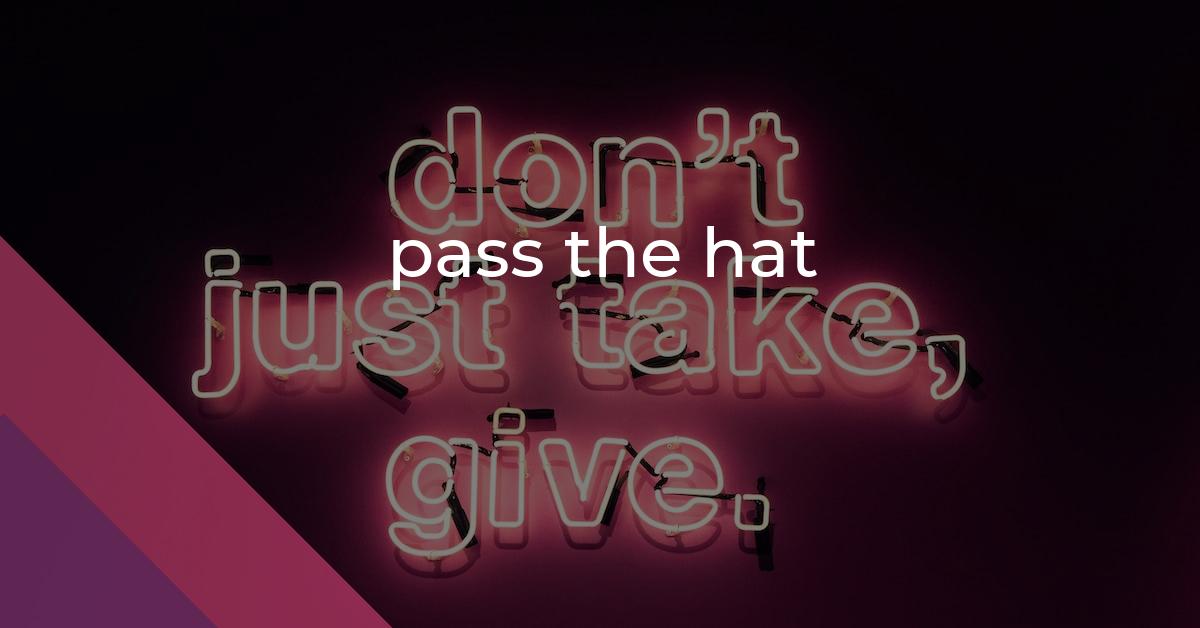pass the hat: Idiom Meaning and Origin
What does ‘pass the hat’ mean?
The idiom "pass the hat" means to collect or contribute money for a particular purpose or cause, typically by individuals giving small amounts of money.

Idiom Explorer
The idiom "take up a collection" means to gather contributions of money or other items from a group of people for a specific purpose or cause.
"Sell the pass" is an idiom that means to betray or deceive someone, especially for personal gain. The origin of the idiom comes from historical military strategies where a pass (a narrow path through mountains or hills) would be strategically sold by a person to the opposing army, allowing them to gain access and defeat their own side. The idiom is often used to describe situations where someone betrays their own team, group, or allies.
An idiom is a phrase that does not have a literal meaning. The idiom "save" means to keep money or resources for future use, or to rescue someone or something from danger or harm.
The idiom *round up* means to gather or collect people or things together, usually for a specific purpose or to ensure everyone is accounted for.
The idiom "rake together" means to gather or collect something, usually in a hurried or hurried manner. It is often used to describe the act of gathering money or resources, typically in a last-minute or desperate situation.
The idiom "put one's name in the hat" means to enter or nominate oneself for a position, opportunity, or chance without being sure of success.
The idiom "put food on the table" means to provide the necessary income or means to support oneself and one's family.
The idiom "put a hat on a hat" means to make a situation or an idea unnecessarily complicated or redundant by adding extra layers or elements.
The idiom "pull out of the hat" means to produce something unexpectedly or miraculously, often to solve a problem or save a situation, as if performing a magic trick.
The idiom "pony up" means to pay or give money, especially when it is expected or demanded. It is often used in a casual or slightly aggressive way to urge someone to contribute their share or fulfill their financial obligation.
Exploring Generosity
The idiom "pass the hat" is a common expression used to describe the act of collecting money or donations from a group of people. The phrase suggests a communal effort or collaborative financial contribution towards a specific cause or goal. This idiom is often used in situations where a group of people contribute money to support a common cause or cover shared expenses.
The origins of this idiom can be traced back to the early 19th century, where it was primarily used in the context of theatrical performances. During that time, actors or performers would pass a hat around the audience after their show, hoping to receive monetary tokens of appreciation from the attendees. This practice was a way for artists to supplement their income, as salaries during those times were often meager.
Over time, the phrase "pass the hat" extended beyond the world of theater and became a metaphor for pooling resources or collecting money in a more general sense. It is often used in fundraising events or charitable activities where participants voluntarily contribute money towards a specific cause. In these situations, "pass the hat" signifies a collaborative effort to achieve a financial goal.
"take up a collection" is another idiom related to "pass the hat." It means to gather money or items from a group of people for a specific purpose. Similar to "pass the hat," this idiom emphasizes the collective effort in contributing towards a common cause. Whether it's for a charity, a gift for someone in need, or to support a community project, taking up a collection involves seeking contributions from a group.
Similarly, "pass the buck" is another idiom related to "pass the hat." However, it has a slightly different meaning. "Pass the buck" is often used to describe the act of shifting or avoiding responsibility. It originated from poker games where a marker or token, known as a "buck," would be passed to the next player to indicate that they were the dealer. In a broader context, "pass the buck" refers to avoiding responsibility by passing it onto someone else.
The idiom "pass the hat" symbolizes a willingness to contribute and support a collective endeavor. It does not carry any negative or positive connotations but emphasizes the importance of a collective contribution. The act of passing a hat highlights the power of communal efforts in achieving financial objectives and the value placed on shared responsibility.
Although the idiom "pass the hat" has a well-established meaning and usage, its interpretation may vary based on cultural and regional contexts. Different countries and communities may have their own specific idioms or expressions to convey similar concepts. However, the versatility and adaptation of the idiom into various social, financial, and cultural contexts demonstrate its endurance and continued relevance in contemporary English-speaking society.
Example usage
Examples of how the idiom pass the hat can be used in a sentence:
- After the concert, the audience passed the hat to collect money for a charitable cause.
- When the local community center needed funding for a new playground, the residents came together to pass the hat and raise the necessary funds.
- Upon hearing about his friend's financial struggle, John decided to pass the hat and gather donations to help him out of the difficult situation.
The phrase "pass the hat" is typically used to refer to the act of collecting money or donations from a group of people to achieve a common goal or support a cause. It implies a sense of collective contribution and participation. In all of the examples provided, the idiom is used in the context of raising funds or helping someone in need.
More "Donations" idioms
We missed the mark - nothing found.



